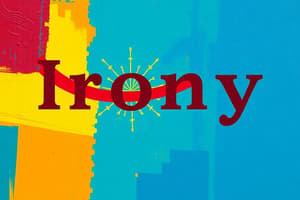Podcast
Questions and Answers
What is verbal irony?
What is verbal irony?
Verbal irony occurs when the literal meaning of a statement is opposite from what the speaker intends.
Provide an example of verbal irony.
Provide an example of verbal irony.
An example of verbal irony is when someone says, 'Oh great, just what I needed,' when they receive good news.
What is dramatic irony?
What is dramatic irony?
Dramatic irony occurs when the audience knows something that the characters do not.
How does dramatic irony create tension in literature?
How does dramatic irony create tension in literature?
Explain situational irony.
Explain situational irony.
Give an example of situational irony in literature.
Give an example of situational irony in literature.
Provide an example of verbal irony in a movie.
Provide an example of verbal irony in a movie.
How does Mark Twain's short story 'The Celebrated Jumping Frog' showcase a paradoxical reversal of fortune?
How does Mark Twain's short story 'The Celebrated Jumping Frog' showcase a paradoxical reversal of fortune?
Explain an example of situational irony in everyday life.
Explain an example of situational irony in everyday life.
How does irony add depth to literature and human interactions?
How does irony add depth to literature and human interactions?
Flashcards are hidden until you start studying
Study Notes
Irony in Text
Irony is a form of humor that uses words in such a way that their intended meaning is different from the actual meaning of the words themselves. It often involves saying something while knowing that it's untrue or unlikely. There are several types of irony found in text, including verbal irony, dramatic irony, situational irony, and examples of irony.
Verbal Irony
Verbal irony occurs when the literal meaning of a statement is opposite from what the speaker intends. For example, if someone says, "Oh great, just what I needed," when they get good news, this statement is an expression of verbal irony. This type of irony helps to make light of difficult situations by acknowledging the inconvenience without dwelling too much on it.
Dramatic Irony
Dramatic irony happens when the audience knows something that the characters do not. In literature, this can create tension because the reader knows something that the characters do not. For instance, in Shakespeare's Hamlet, the audience knows that the skull Hamlet holds belongs to Yorick, while the characters believe it to be someone else's, creating suspense and tension within the plot.
Situational Irony
Situational irony occurs when the actual outcome of a situation is different from what was expected. For example, if a fire station burns down, this event represents situational irony. Another example is Mark Twain's short story "The Celebrated Jumping Frog," where a frog jumps higher in death than it did alive, showcasing a paradoxical reversal of fortune.
Examples of Irony
There are numerous examples of irony in literature, movies, and everyday conversations. Some examples include:
-
Literature: Charles Dickens' novel "Bleak House" opens with a character complaining about the fog, only to find out later that the fog he despised was actually crucial for his character development.
-
Movies: In the movie "Airplane!" (1980), after hearing repeated warnings about turbulence, a passenger says, "I've got a terrible feeling inside my stomach," just before the plane enters smooth air.
-
Everyday Life: When someone complains about a government spending billions on wars, only to receive a tax refund due to budget surpluses.
Irony adds depth to literature and human interactions, making otherwise mundane scenarios interesting and enjoyable. Understanding and using irony effectively can enhance communication and bring levity to serious discussions.
Studying That Suits You
Use AI to generate personalized quizzes and flashcards to suit your learning preferences.




